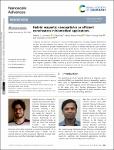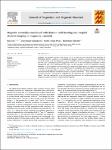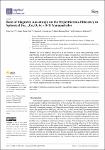Browsing by Advisor Srikanth, Hariharan
Showing results [1 - 3] / 3
Heating at the nanoscale is the basis of several biomedical applications, including magnetic hyperthermia therapies and heat-triggered drug delivery. The combination of multiple inorganic materials in hybrid magnetic nanoparticles provides versatile platforms to achieve an efficient heat delivery upon different external stimuli or to get an optical feedback during the process. However, the successful design and application of these nanomaterials usually require intricate synthesis routes and their magnetic response is still not fully understood. In this review we give an overview of the novel systems reported in the last few years, which have been mostly obtained by organic phase-base... |
Magnetite has fascinated researchers for decades, due to its wide range of applications from spintronics to biomedicine. Despite a large body of works aimed at its magnetic properties, no consensus has been reached on the physical origin of the low temperature magnetic anomalies observed in magnetite. Although, a lot of work has been done in studying magnetite nanoparticles, but studies on the low temperature anomalies in those nanoparticles still remains unresearched. We report on the observation of the low temperature magnetic anomalies in highly crystalline, stoichiometric Fe3O4 nanorods and relate them to the coupled electron hopping relaxation process and domain wall motion. Both... |
The use of magnetic nanoparticles in the treatment of cancer using alternating current hyperthermia therapy has shown the potential to replace or supplement conventional cancer treatments, radiotherapy and chemotherapy, which have severe side effects. Though the nearly spherical sub-10 nm iron oxide nanoparticles have their approval from the US Food and Drug Administration, their low heating efficiency and removal from the body after hyperthermia treatment raises serious concerns. The majority of magnetic hyperthermia research is working to create nanomaterials with improved heating efficiency and long blood circulation time. Here, we have demonstrated a simple strategy to enhance the... |



